Analysis of Discrimination at a Utility Company
VerifiedAdded on 2023/04/21
|10
|2783
|307
AI Summary
This paper analyzes the business ethics issue of discrimination at a utility company, provides recommendations for resolution, and presents a long-term strategy for change.
Contribute Materials
Your contribution can guide someone’s learning journey. Share your
documents today.
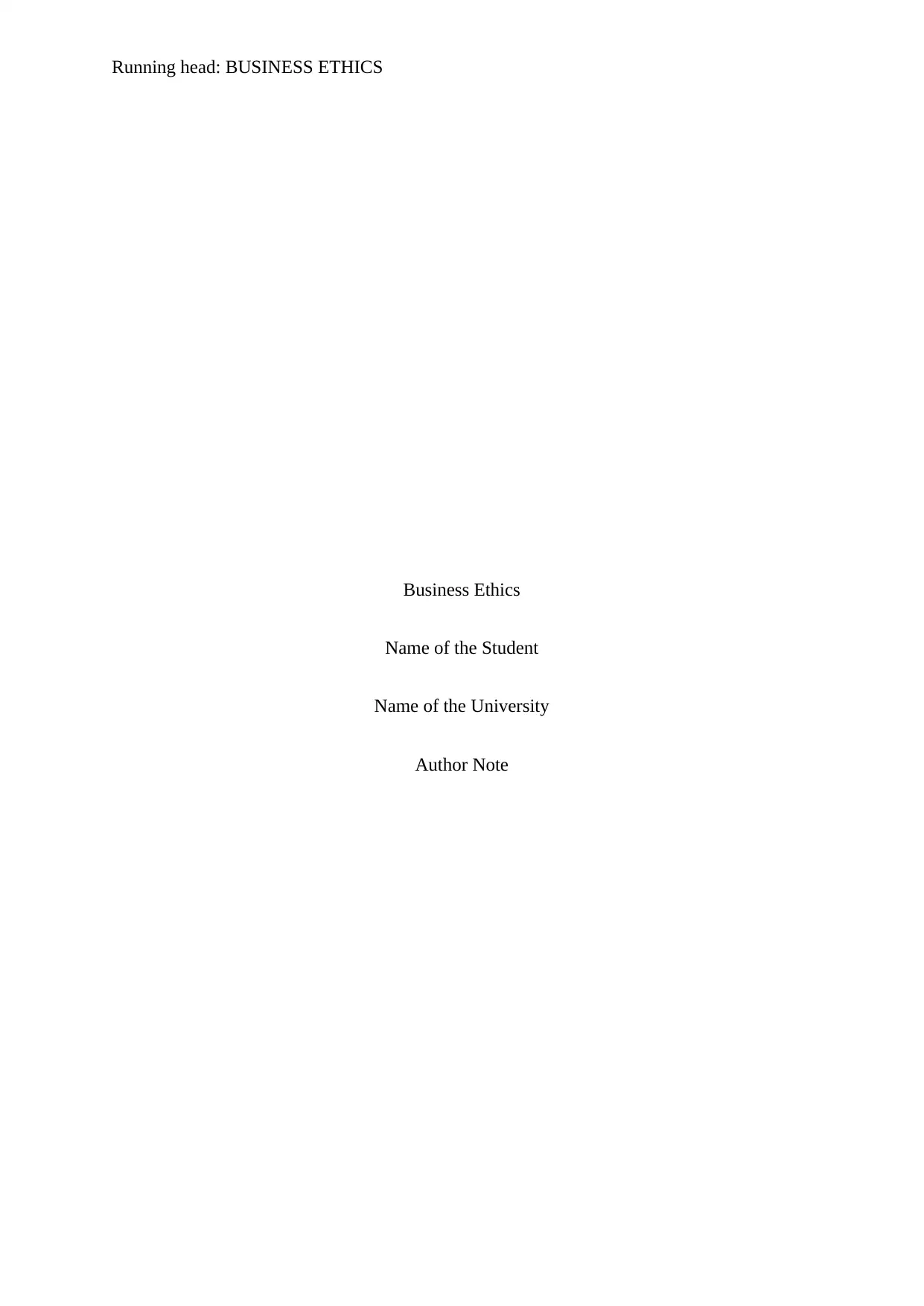
Running head: BUSINESS ETHICS
Business Ethics
Name of the Student
Name of the University
Author Note
Business Ethics
Name of the Student
Name of the University
Author Note
Secure Best Marks with AI Grader
Need help grading? Try our AI Grader for instant feedback on your assignments.
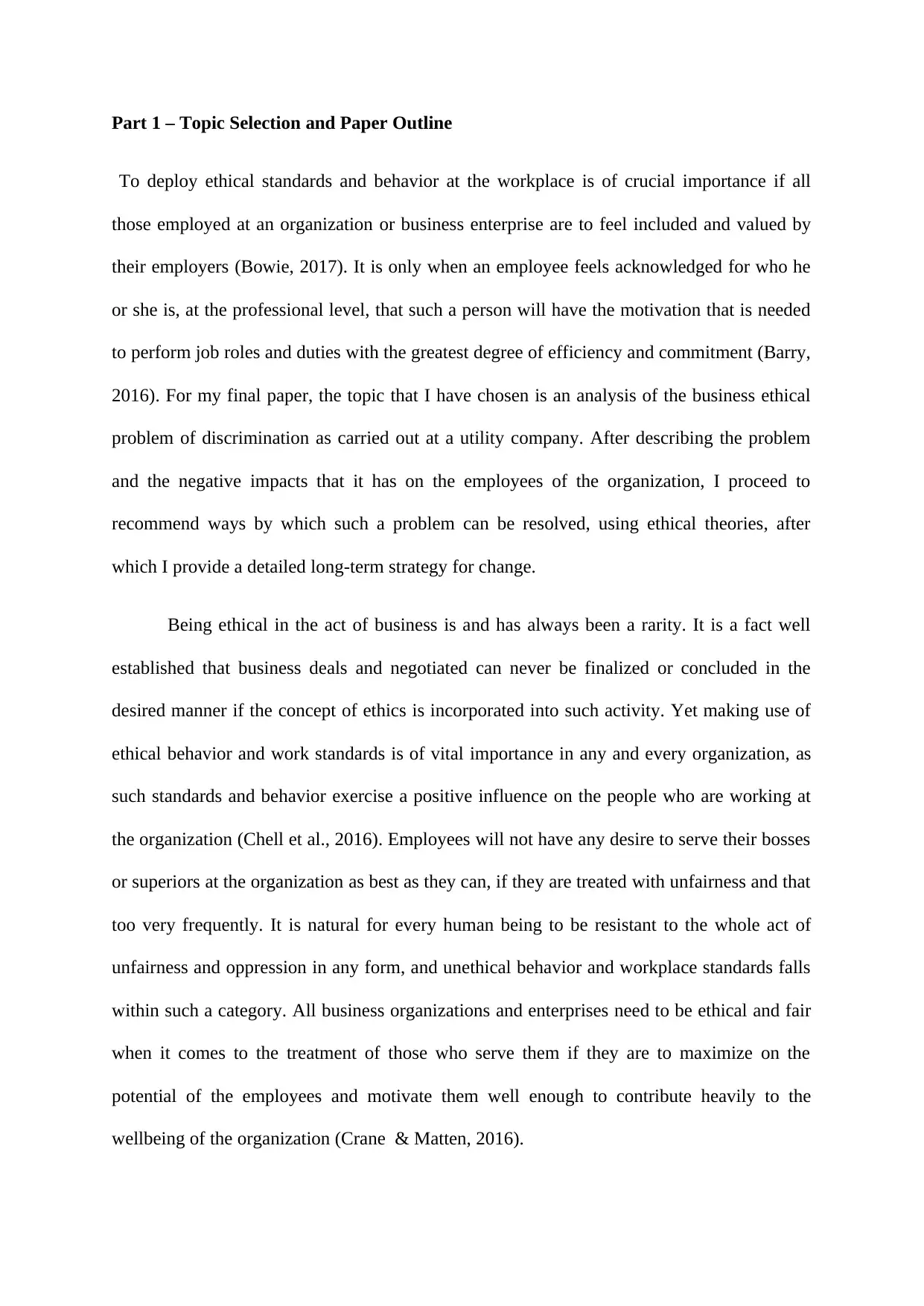
Part 1 – Topic Selection and Paper Outline
To deploy ethical standards and behavior at the workplace is of crucial importance if all
those employed at an organization or business enterprise are to feel included and valued by
their employers (Bowie, 2017). It is only when an employee feels acknowledged for who he
or she is, at the professional level, that such a person will have the motivation that is needed
to perform job roles and duties with the greatest degree of efficiency and commitment (Barry,
2016). For my final paper, the topic that I have chosen is an analysis of the business ethical
problem of discrimination as carried out at a utility company. After describing the problem
and the negative impacts that it has on the employees of the organization, I proceed to
recommend ways by which such a problem can be resolved, using ethical theories, after
which I provide a detailed long-term strategy for change.
Being ethical in the act of business is and has always been a rarity. It is a fact well
established that business deals and negotiated can never be finalized or concluded in the
desired manner if the concept of ethics is incorporated into such activity. Yet making use of
ethical behavior and work standards is of vital importance in any and every organization, as
such standards and behavior exercise a positive influence on the people who are working at
the organization (Chell et al., 2016). Employees will not have any desire to serve their bosses
or superiors at the organization as best as they can, if they are treated with unfairness and that
too very frequently. It is natural for every human being to be resistant to the whole act of
unfairness and oppression in any form, and unethical behavior and workplace standards falls
within such a category. All business organizations and enterprises need to be ethical and fair
when it comes to the treatment of those who serve them if they are to maximize on the
potential of the employees and motivate them well enough to contribute heavily to the
wellbeing of the organization (Crane & Matten, 2016).
To deploy ethical standards and behavior at the workplace is of crucial importance if all
those employed at an organization or business enterprise are to feel included and valued by
their employers (Bowie, 2017). It is only when an employee feels acknowledged for who he
or she is, at the professional level, that such a person will have the motivation that is needed
to perform job roles and duties with the greatest degree of efficiency and commitment (Barry,
2016). For my final paper, the topic that I have chosen is an analysis of the business ethical
problem of discrimination as carried out at a utility company. After describing the problem
and the negative impacts that it has on the employees of the organization, I proceed to
recommend ways by which such a problem can be resolved, using ethical theories, after
which I provide a detailed long-term strategy for change.
Being ethical in the act of business is and has always been a rarity. It is a fact well
established that business deals and negotiated can never be finalized or concluded in the
desired manner if the concept of ethics is incorporated into such activity. Yet making use of
ethical behavior and work standards is of vital importance in any and every organization, as
such standards and behavior exercise a positive influence on the people who are working at
the organization (Chell et al., 2016). Employees will not have any desire to serve their bosses
or superiors at the organization as best as they can, if they are treated with unfairness and that
too very frequently. It is natural for every human being to be resistant to the whole act of
unfairness and oppression in any form, and unethical behavior and workplace standards falls
within such a category. All business organizations and enterprises need to be ethical and fair
when it comes to the treatment of those who serve them if they are to maximize on the
potential of the employees and motivate them well enough to contribute heavily to the
wellbeing of the organization (Crane & Matten, 2016).
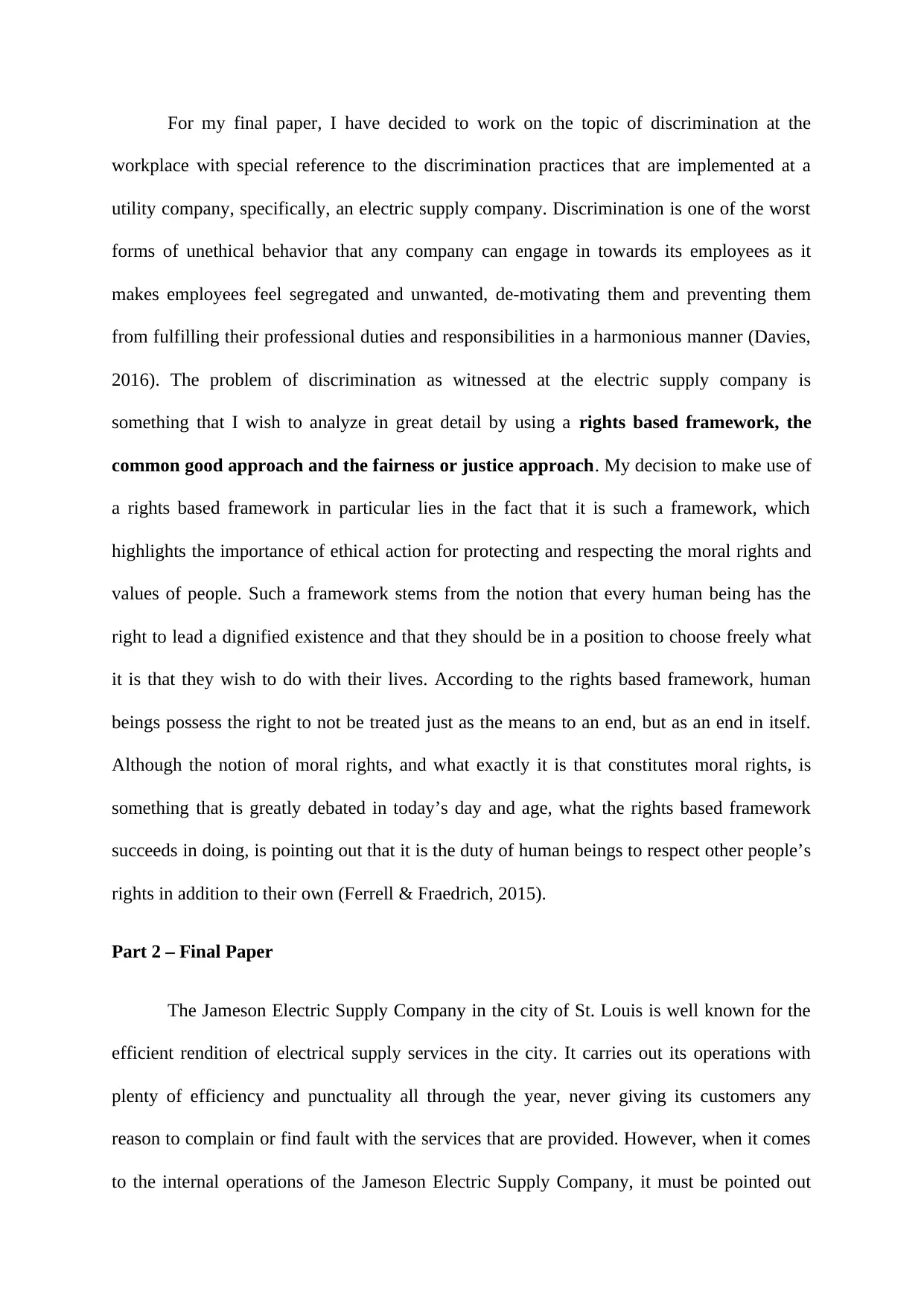
For my final paper, I have decided to work on the topic of discrimination at the
workplace with special reference to the discrimination practices that are implemented at a
utility company, specifically, an electric supply company. Discrimination is one of the worst
forms of unethical behavior that any company can engage in towards its employees as it
makes employees feel segregated and unwanted, de-motivating them and preventing them
from fulfilling their professional duties and responsibilities in a harmonious manner (Davies,
2016). The problem of discrimination as witnessed at the electric supply company is
something that I wish to analyze in great detail by using a rights based framework, the
common good approach and the fairness or justice approach. My decision to make use of
a rights based framework in particular lies in the fact that it is such a framework, which
highlights the importance of ethical action for protecting and respecting the moral rights and
values of people. Such a framework stems from the notion that every human being has the
right to lead a dignified existence and that they should be in a position to choose freely what
it is that they wish to do with their lives. According to the rights based framework, human
beings possess the right to not be treated just as the means to an end, but as an end in itself.
Although the notion of moral rights, and what exactly it is that constitutes moral rights, is
something that is greatly debated in today’s day and age, what the rights based framework
succeeds in doing, is pointing out that it is the duty of human beings to respect other people’s
rights in addition to their own (Ferrell & Fraedrich, 2015).
Part 2 – Final Paper
The Jameson Electric Supply Company in the city of St. Louis is well known for the
efficient rendition of electrical supply services in the city. It carries out its operations with
plenty of efficiency and punctuality all through the year, never giving its customers any
reason to complain or find fault with the services that are provided. However, when it comes
to the internal operations of the Jameson Electric Supply Company, it must be pointed out
workplace with special reference to the discrimination practices that are implemented at a
utility company, specifically, an electric supply company. Discrimination is one of the worst
forms of unethical behavior that any company can engage in towards its employees as it
makes employees feel segregated and unwanted, de-motivating them and preventing them
from fulfilling their professional duties and responsibilities in a harmonious manner (Davies,
2016). The problem of discrimination as witnessed at the electric supply company is
something that I wish to analyze in great detail by using a rights based framework, the
common good approach and the fairness or justice approach. My decision to make use of
a rights based framework in particular lies in the fact that it is such a framework, which
highlights the importance of ethical action for protecting and respecting the moral rights and
values of people. Such a framework stems from the notion that every human being has the
right to lead a dignified existence and that they should be in a position to choose freely what
it is that they wish to do with their lives. According to the rights based framework, human
beings possess the right to not be treated just as the means to an end, but as an end in itself.
Although the notion of moral rights, and what exactly it is that constitutes moral rights, is
something that is greatly debated in today’s day and age, what the rights based framework
succeeds in doing, is pointing out that it is the duty of human beings to respect other people’s
rights in addition to their own (Ferrell & Fraedrich, 2015).
Part 2 – Final Paper
The Jameson Electric Supply Company in the city of St. Louis is well known for the
efficient rendition of electrical supply services in the city. It carries out its operations with
plenty of efficiency and punctuality all through the year, never giving its customers any
reason to complain or find fault with the services that are provided. However, when it comes
to the internal operations of the Jameson Electric Supply Company, it must be pointed out
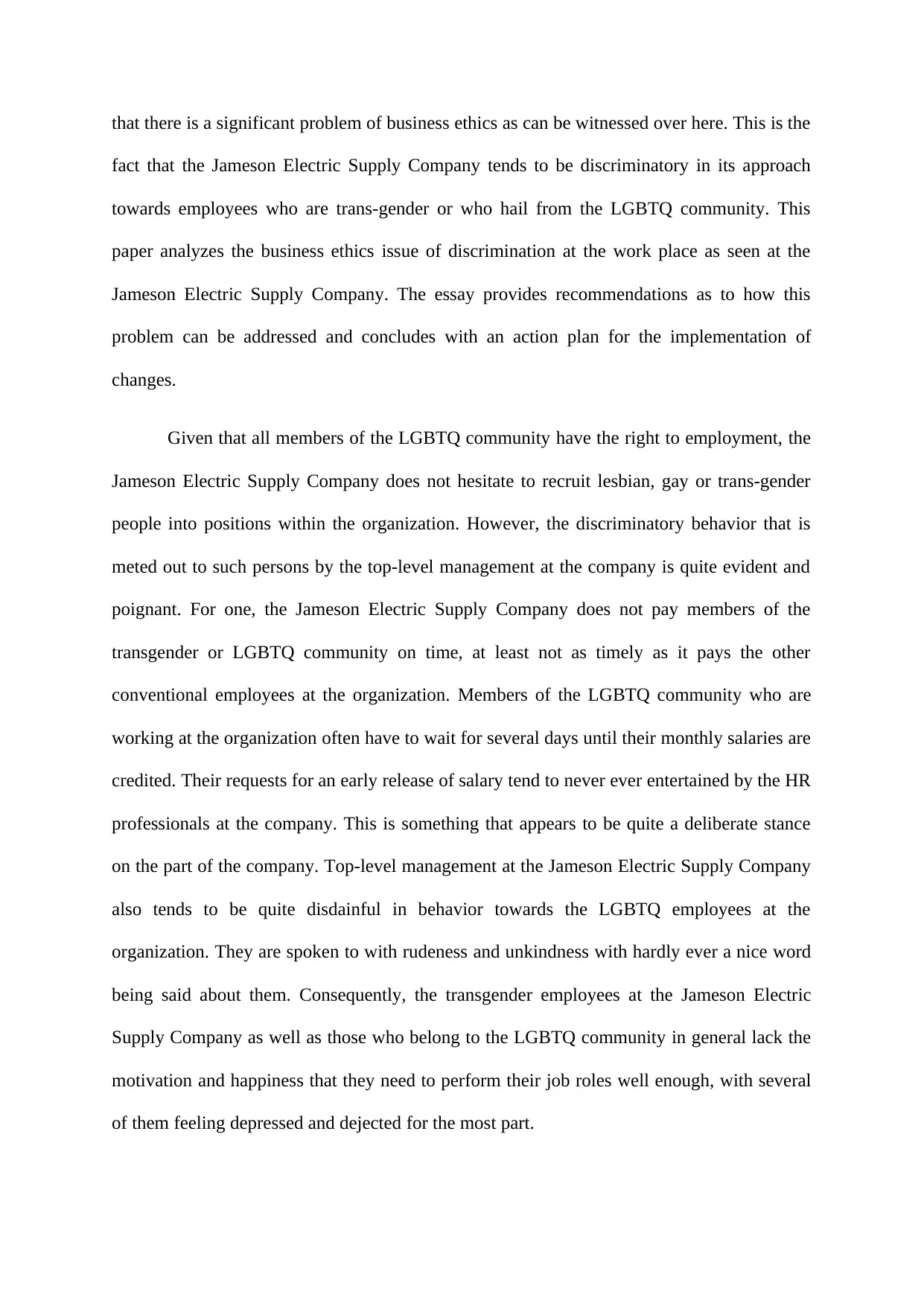
that there is a significant problem of business ethics as can be witnessed over here. This is the
fact that the Jameson Electric Supply Company tends to be discriminatory in its approach
towards employees who are trans-gender or who hail from the LGBTQ community. This
paper analyzes the business ethics issue of discrimination at the work place as seen at the
Jameson Electric Supply Company. The essay provides recommendations as to how this
problem can be addressed and concludes with an action plan for the implementation of
changes.
Given that all members of the LGBTQ community have the right to employment, the
Jameson Electric Supply Company does not hesitate to recruit lesbian, gay or trans-gender
people into positions within the organization. However, the discriminatory behavior that is
meted out to such persons by the top-level management at the company is quite evident and
poignant. For one, the Jameson Electric Supply Company does not pay members of the
transgender or LGBTQ community on time, at least not as timely as it pays the other
conventional employees at the organization. Members of the LGBTQ community who are
working at the organization often have to wait for several days until their monthly salaries are
credited. Their requests for an early release of salary tend to never ever entertained by the HR
professionals at the company. This is something that appears to be quite a deliberate stance
on the part of the company. Top-level management at the Jameson Electric Supply Company
also tends to be quite disdainful in behavior towards the LGBTQ employees at the
organization. They are spoken to with rudeness and unkindness with hardly ever a nice word
being said about them. Consequently, the transgender employees at the Jameson Electric
Supply Company as well as those who belong to the LGBTQ community in general lack the
motivation and happiness that they need to perform their job roles well enough, with several
of them feeling depressed and dejected for the most part.
fact that the Jameson Electric Supply Company tends to be discriminatory in its approach
towards employees who are trans-gender or who hail from the LGBTQ community. This
paper analyzes the business ethics issue of discrimination at the work place as seen at the
Jameson Electric Supply Company. The essay provides recommendations as to how this
problem can be addressed and concludes with an action plan for the implementation of
changes.
Given that all members of the LGBTQ community have the right to employment, the
Jameson Electric Supply Company does not hesitate to recruit lesbian, gay or trans-gender
people into positions within the organization. However, the discriminatory behavior that is
meted out to such persons by the top-level management at the company is quite evident and
poignant. For one, the Jameson Electric Supply Company does not pay members of the
transgender or LGBTQ community on time, at least not as timely as it pays the other
conventional employees at the organization. Members of the LGBTQ community who are
working at the organization often have to wait for several days until their monthly salaries are
credited. Their requests for an early release of salary tend to never ever entertained by the HR
professionals at the company. This is something that appears to be quite a deliberate stance
on the part of the company. Top-level management at the Jameson Electric Supply Company
also tends to be quite disdainful in behavior towards the LGBTQ employees at the
organization. They are spoken to with rudeness and unkindness with hardly ever a nice word
being said about them. Consequently, the transgender employees at the Jameson Electric
Supply Company as well as those who belong to the LGBTQ community in general lack the
motivation and happiness that they need to perform their job roles well enough, with several
of them feeling depressed and dejected for the most part.
Secure Best Marks with AI Grader
Need help grading? Try our AI Grader for instant feedback on your assignments.
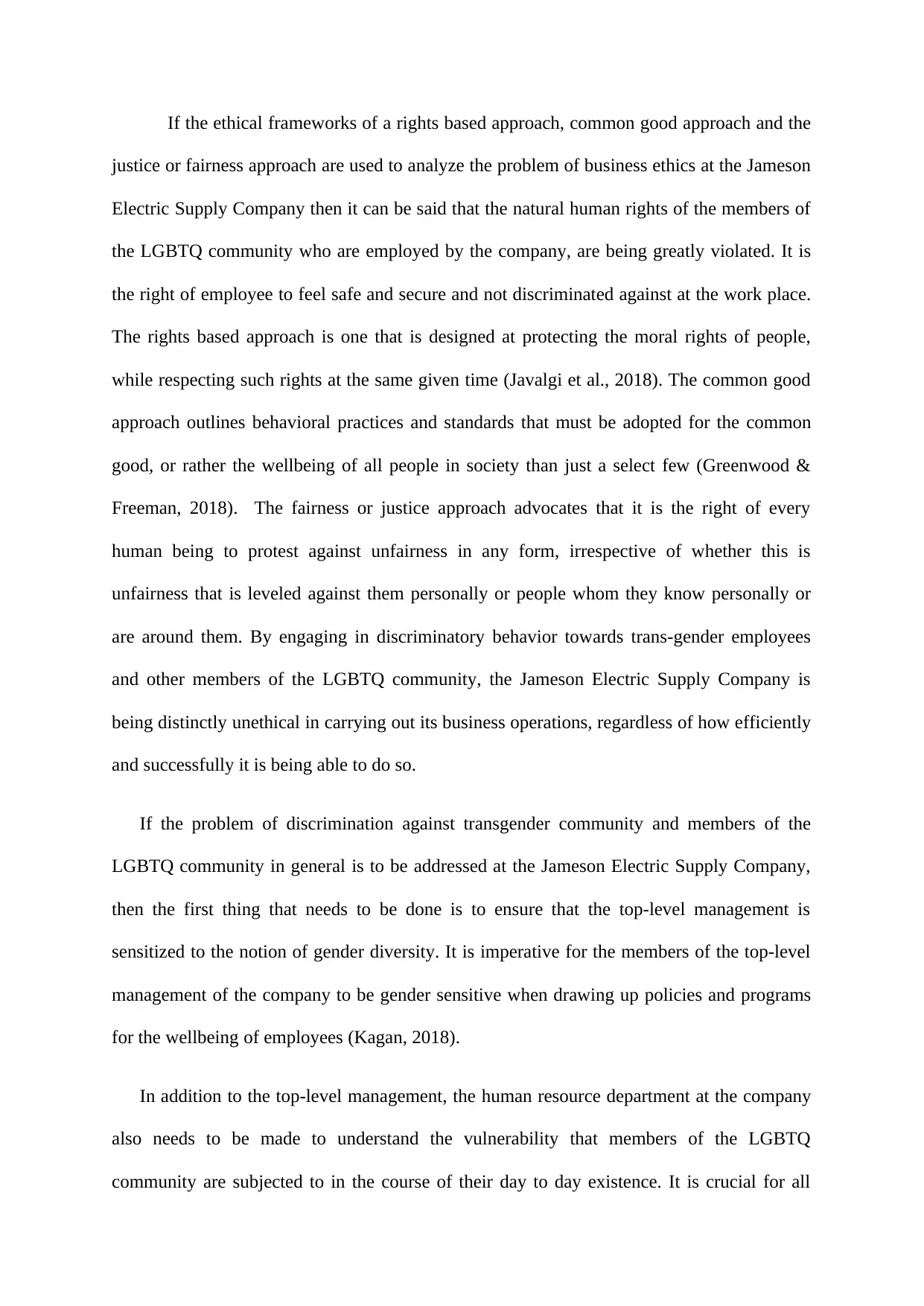
If the ethical frameworks of a rights based approach, common good approach and the
justice or fairness approach are used to analyze the problem of business ethics at the Jameson
Electric Supply Company then it can be said that the natural human rights of the members of
the LGBTQ community who are employed by the company, are being greatly violated. It is
the right of employee to feel safe and secure and not discriminated against at the work place.
The rights based approach is one that is designed at protecting the moral rights of people,
while respecting such rights at the same given time (Javalgi et al., 2018). The common good
approach outlines behavioral practices and standards that must be adopted for the common
good, or rather the wellbeing of all people in society than just a select few (Greenwood &
Freeman, 2018). The fairness or justice approach advocates that it is the right of every
human being to protest against unfairness in any form, irrespective of whether this is
unfairness that is leveled against them personally or people whom they know personally or
are around them. By engaging in discriminatory behavior towards trans-gender employees
and other members of the LGBTQ community, the Jameson Electric Supply Company is
being distinctly unethical in carrying out its business operations, regardless of how efficiently
and successfully it is being able to do so.
If the problem of discrimination against transgender community and members of the
LGBTQ community in general is to be addressed at the Jameson Electric Supply Company,
then the first thing that needs to be done is to ensure that the top-level management is
sensitized to the notion of gender diversity. It is imperative for the members of the top-level
management of the company to be gender sensitive when drawing up policies and programs
for the wellbeing of employees (Kagan, 2018).
In addition to the top-level management, the human resource department at the company
also needs to be made to understand the vulnerability that members of the LGBTQ
community are subjected to in the course of their day to day existence. It is crucial for all
justice or fairness approach are used to analyze the problem of business ethics at the Jameson
Electric Supply Company then it can be said that the natural human rights of the members of
the LGBTQ community who are employed by the company, are being greatly violated. It is
the right of employee to feel safe and secure and not discriminated against at the work place.
The rights based approach is one that is designed at protecting the moral rights of people,
while respecting such rights at the same given time (Javalgi et al., 2018). The common good
approach outlines behavioral practices and standards that must be adopted for the common
good, or rather the wellbeing of all people in society than just a select few (Greenwood &
Freeman, 2018). The fairness or justice approach advocates that it is the right of every
human being to protest against unfairness in any form, irrespective of whether this is
unfairness that is leveled against them personally or people whom they know personally or
are around them. By engaging in discriminatory behavior towards trans-gender employees
and other members of the LGBTQ community, the Jameson Electric Supply Company is
being distinctly unethical in carrying out its business operations, regardless of how efficiently
and successfully it is being able to do so.
If the problem of discrimination against transgender community and members of the
LGBTQ community in general is to be addressed at the Jameson Electric Supply Company,
then the first thing that needs to be done is to ensure that the top-level management is
sensitized to the notion of gender diversity. It is imperative for the members of the top-level
management of the company to be gender sensitive when drawing up policies and programs
for the wellbeing of employees (Kagan, 2018).
In addition to the top-level management, the human resource department at the company
also needs to be made to understand the vulnerability that members of the LGBTQ
community are subjected to in the course of their day to day existence. It is crucial for all
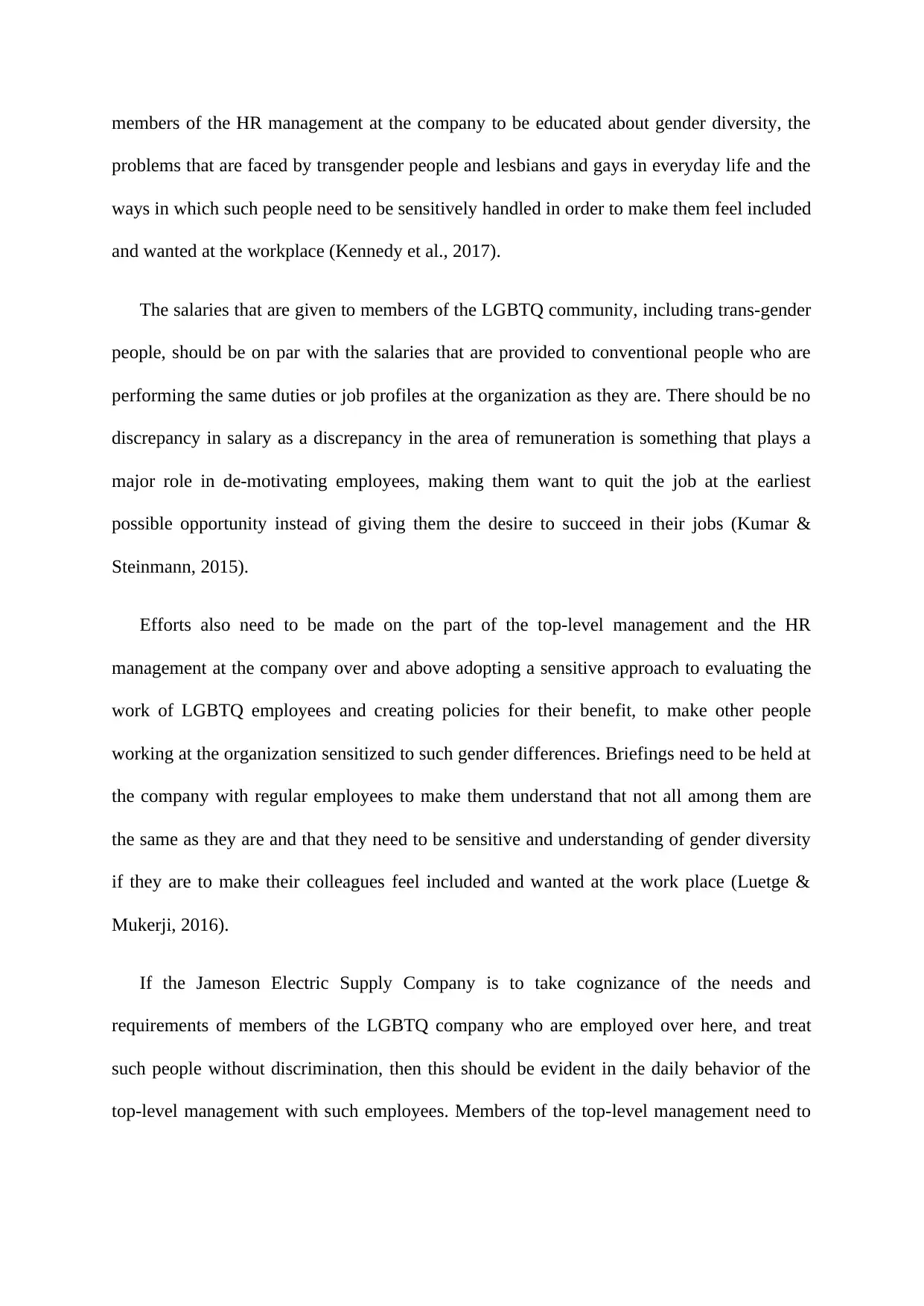
members of the HR management at the company to be educated about gender diversity, the
problems that are faced by transgender people and lesbians and gays in everyday life and the
ways in which such people need to be sensitively handled in order to make them feel included
and wanted at the workplace (Kennedy et al., 2017).
The salaries that are given to members of the LGBTQ community, including trans-gender
people, should be on par with the salaries that are provided to conventional people who are
performing the same duties or job profiles at the organization as they are. There should be no
discrepancy in salary as a discrepancy in the area of remuneration is something that plays a
major role in de-motivating employees, making them want to quit the job at the earliest
possible opportunity instead of giving them the desire to succeed in their jobs (Kumar &
Steinmann, 2015).
Efforts also need to be made on the part of the top-level management and the HR
management at the company over and above adopting a sensitive approach to evaluating the
work of LGBTQ employees and creating policies for their benefit, to make other people
working at the organization sensitized to such gender differences. Briefings need to be held at
the company with regular employees to make them understand that not all among them are
the same as they are and that they need to be sensitive and understanding of gender diversity
if they are to make their colleagues feel included and wanted at the work place (Luetge &
Mukerji, 2016).
If the Jameson Electric Supply Company is to take cognizance of the needs and
requirements of members of the LGBTQ company who are employed over here, and treat
such people without discrimination, then this should be evident in the daily behavior of the
top-level management with such employees. Members of the top-level management need to
problems that are faced by transgender people and lesbians and gays in everyday life and the
ways in which such people need to be sensitively handled in order to make them feel included
and wanted at the workplace (Kennedy et al., 2017).
The salaries that are given to members of the LGBTQ community, including trans-gender
people, should be on par with the salaries that are provided to conventional people who are
performing the same duties or job profiles at the organization as they are. There should be no
discrepancy in salary as a discrepancy in the area of remuneration is something that plays a
major role in de-motivating employees, making them want to quit the job at the earliest
possible opportunity instead of giving them the desire to succeed in their jobs (Kumar &
Steinmann, 2015).
Efforts also need to be made on the part of the top-level management and the HR
management at the company over and above adopting a sensitive approach to evaluating the
work of LGBTQ employees and creating policies for their benefit, to make other people
working at the organization sensitized to such gender differences. Briefings need to be held at
the company with regular employees to make them understand that not all among them are
the same as they are and that they need to be sensitive and understanding of gender diversity
if they are to make their colleagues feel included and wanted at the work place (Luetge &
Mukerji, 2016).
If the Jameson Electric Supply Company is to take cognizance of the needs and
requirements of members of the LGBTQ company who are employed over here, and treat
such people without discrimination, then this should be evident in the daily behavior of the
top-level management with such employees. Members of the top-level management need to
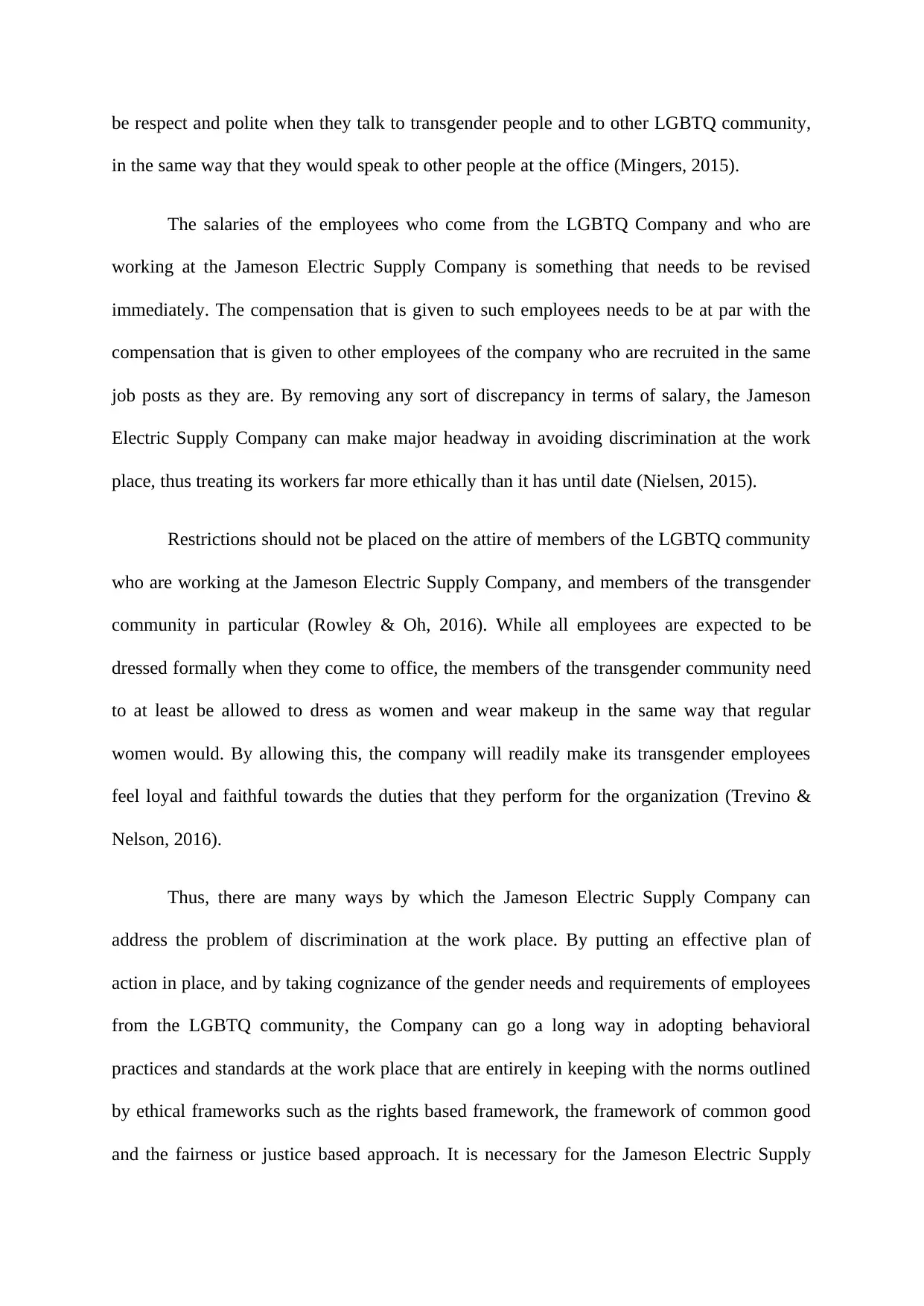
be respect and polite when they talk to transgender people and to other LGBTQ community,
in the same way that they would speak to other people at the office (Mingers, 2015).
The salaries of the employees who come from the LGBTQ Company and who are
working at the Jameson Electric Supply Company is something that needs to be revised
immediately. The compensation that is given to such employees needs to be at par with the
compensation that is given to other employees of the company who are recruited in the same
job posts as they are. By removing any sort of discrepancy in terms of salary, the Jameson
Electric Supply Company can make major headway in avoiding discrimination at the work
place, thus treating its workers far more ethically than it has until date (Nielsen, 2015).
Restrictions should not be placed on the attire of members of the LGBTQ community
who are working at the Jameson Electric Supply Company, and members of the transgender
community in particular (Rowley & Oh, 2016). While all employees are expected to be
dressed formally when they come to office, the members of the transgender community need
to at least be allowed to dress as women and wear makeup in the same way that regular
women would. By allowing this, the company will readily make its transgender employees
feel loyal and faithful towards the duties that they perform for the organization (Trevino &
Nelson, 2016).
Thus, there are many ways by which the Jameson Electric Supply Company can
address the problem of discrimination at the work place. By putting an effective plan of
action in place, and by taking cognizance of the gender needs and requirements of employees
from the LGBTQ community, the Company can go a long way in adopting behavioral
practices and standards at the work place that are entirely in keeping with the norms outlined
by ethical frameworks such as the rights based framework, the framework of common good
and the fairness or justice based approach. It is necessary for the Jameson Electric Supply
in the same way that they would speak to other people at the office (Mingers, 2015).
The salaries of the employees who come from the LGBTQ Company and who are
working at the Jameson Electric Supply Company is something that needs to be revised
immediately. The compensation that is given to such employees needs to be at par with the
compensation that is given to other employees of the company who are recruited in the same
job posts as they are. By removing any sort of discrepancy in terms of salary, the Jameson
Electric Supply Company can make major headway in avoiding discrimination at the work
place, thus treating its workers far more ethically than it has until date (Nielsen, 2015).
Restrictions should not be placed on the attire of members of the LGBTQ community
who are working at the Jameson Electric Supply Company, and members of the transgender
community in particular (Rowley & Oh, 2016). While all employees are expected to be
dressed formally when they come to office, the members of the transgender community need
to at least be allowed to dress as women and wear makeup in the same way that regular
women would. By allowing this, the company will readily make its transgender employees
feel loyal and faithful towards the duties that they perform for the organization (Trevino &
Nelson, 2016).
Thus, there are many ways by which the Jameson Electric Supply Company can
address the problem of discrimination at the work place. By putting an effective plan of
action in place, and by taking cognizance of the gender needs and requirements of employees
from the LGBTQ community, the Company can go a long way in adopting behavioral
practices and standards at the work place that are entirely in keeping with the norms outlined
by ethical frameworks such as the rights based framework, the framework of common good
and the fairness or justice based approach. It is necessary for the Jameson Electric Supply
Paraphrase This Document
Need a fresh take? Get an instant paraphrase of this document with our AI Paraphraser
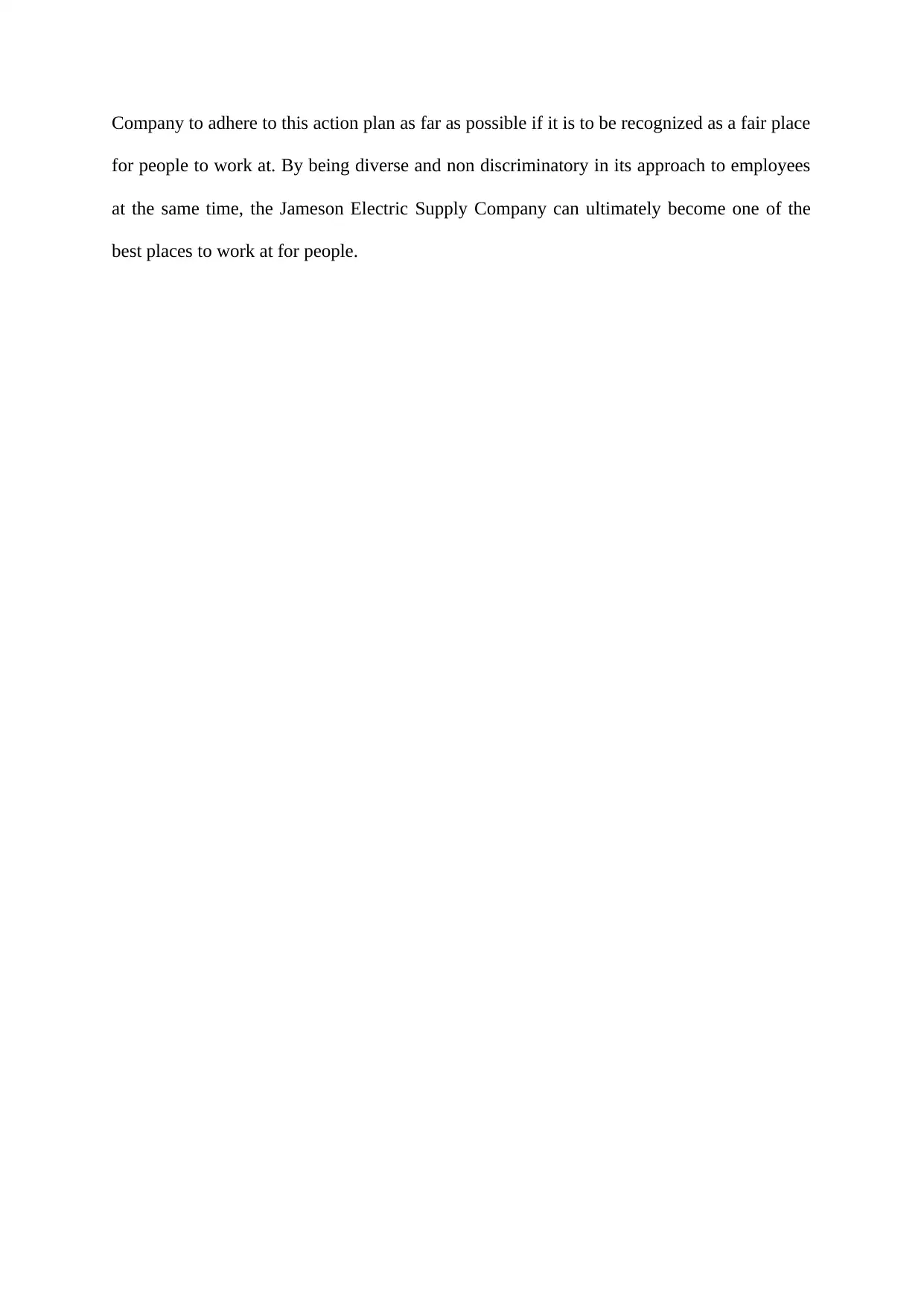
Company to adhere to this action plan as far as possible if it is to be recognized as a fair place
for people to work at. By being diverse and non discriminatory in its approach to employees
at the same time, the Jameson Electric Supply Company can ultimately become one of the
best places to work at for people.
for people to work at. By being diverse and non discriminatory in its approach to employees
at the same time, the Jameson Electric Supply Company can ultimately become one of the
best places to work at for people.
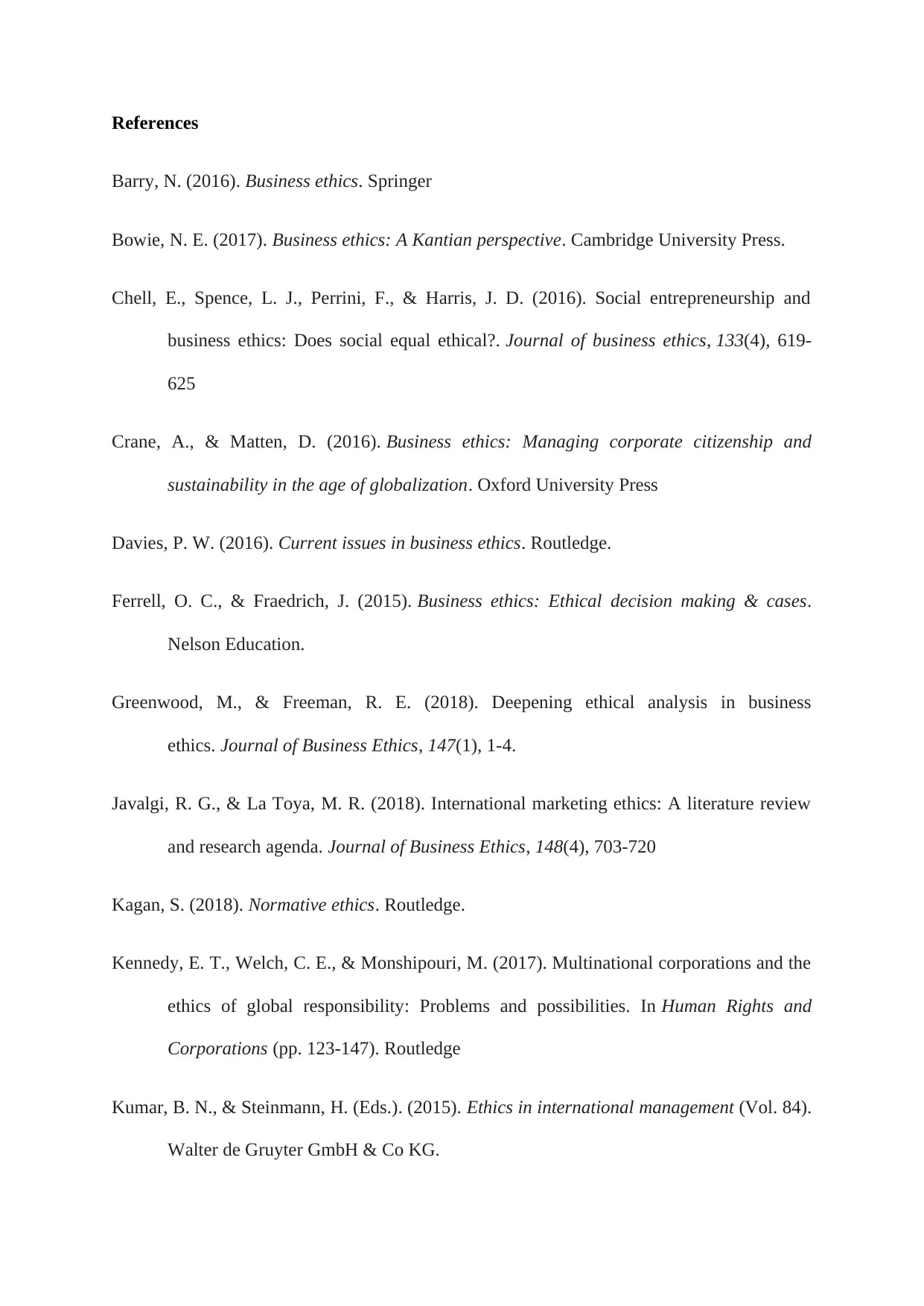
References
Barry, N. (2016). Business ethics. Springer
Bowie, N. E. (2017). Business ethics: A Kantian perspective. Cambridge University Press.
Chell, E., Spence, L. J., Perrini, F., & Harris, J. D. (2016). Social entrepreneurship and
business ethics: Does social equal ethical?. Journal of business ethics, 133(4), 619-
625
Crane, A., & Matten, D. (2016). Business ethics: Managing corporate citizenship and
sustainability in the age of globalization. Oxford University Press
Davies, P. W. (2016). Current issues in business ethics. Routledge.
Ferrell, O. C., & Fraedrich, J. (2015). Business ethics: Ethical decision making & cases.
Nelson Education.
Greenwood, M., & Freeman, R. E. (2018). Deepening ethical analysis in business
ethics. Journal of Business Ethics, 147(1), 1-4.
Javalgi, R. G., & La Toya, M. R. (2018). International marketing ethics: A literature review
and research agenda. Journal of Business Ethics, 148(4), 703-720
Kagan, S. (2018). Normative ethics. Routledge.
Kennedy, E. T., Welch, C. E., & Monshipouri, M. (2017). Multinational corporations and the
ethics of global responsibility: Problems and possibilities. In Human Rights and
Corporations (pp. 123-147). Routledge
Kumar, B. N., & Steinmann, H. (Eds.). (2015). Ethics in international management (Vol. 84).
Walter de Gruyter GmbH & Co KG.
Barry, N. (2016). Business ethics. Springer
Bowie, N. E. (2017). Business ethics: A Kantian perspective. Cambridge University Press.
Chell, E., Spence, L. J., Perrini, F., & Harris, J. D. (2016). Social entrepreneurship and
business ethics: Does social equal ethical?. Journal of business ethics, 133(4), 619-
625
Crane, A., & Matten, D. (2016). Business ethics: Managing corporate citizenship and
sustainability in the age of globalization. Oxford University Press
Davies, P. W. (2016). Current issues in business ethics. Routledge.
Ferrell, O. C., & Fraedrich, J. (2015). Business ethics: Ethical decision making & cases.
Nelson Education.
Greenwood, M., & Freeman, R. E. (2018). Deepening ethical analysis in business
ethics. Journal of Business Ethics, 147(1), 1-4.
Javalgi, R. G., & La Toya, M. R. (2018). International marketing ethics: A literature review
and research agenda. Journal of Business Ethics, 148(4), 703-720
Kagan, S. (2018). Normative ethics. Routledge.
Kennedy, E. T., Welch, C. E., & Monshipouri, M. (2017). Multinational corporations and the
ethics of global responsibility: Problems and possibilities. In Human Rights and
Corporations (pp. 123-147). Routledge
Kumar, B. N., & Steinmann, H. (Eds.). (2015). Ethics in international management (Vol. 84).
Walter de Gruyter GmbH & Co KG.
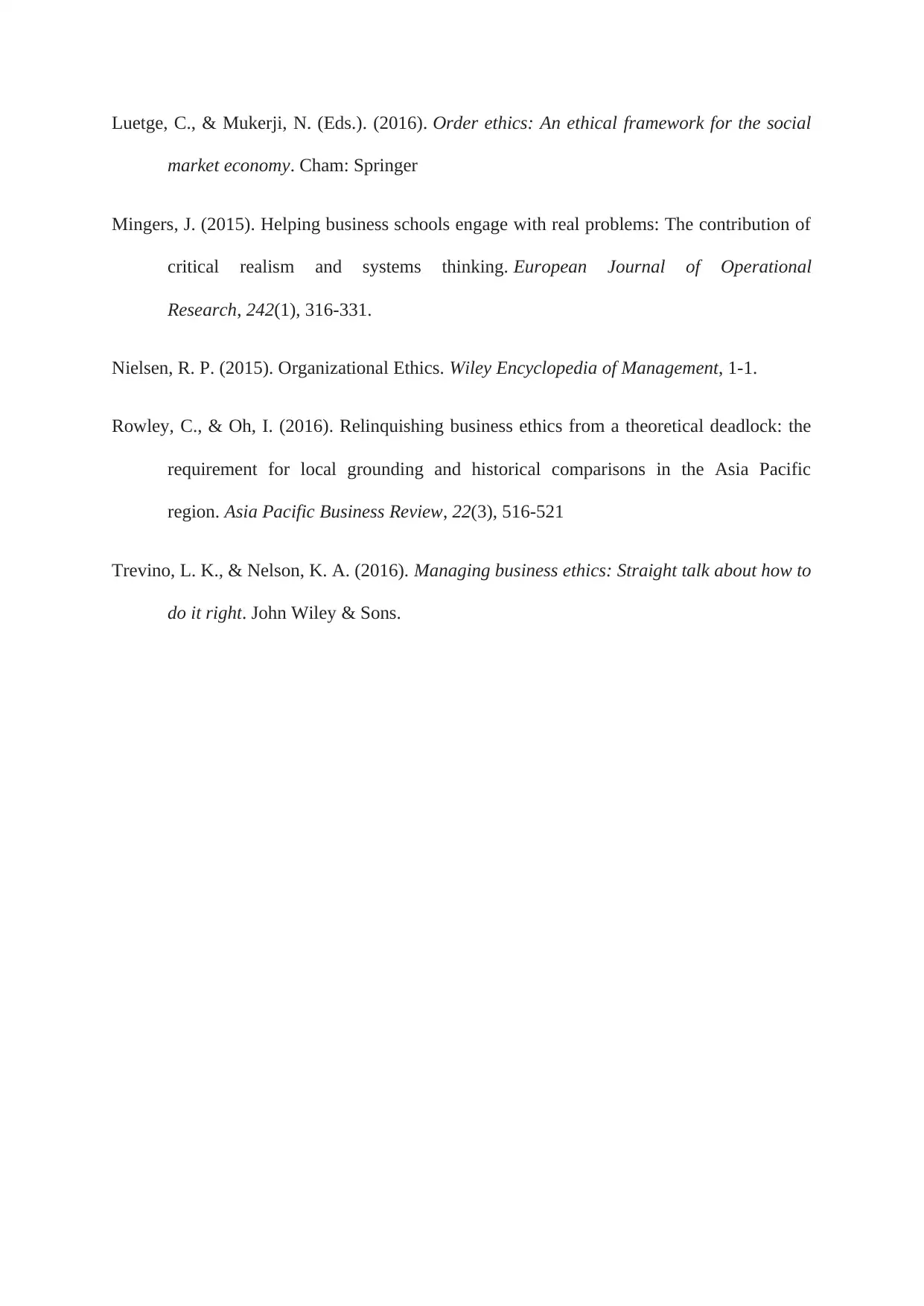
Luetge, C., & Mukerji, N. (Eds.). (2016). Order ethics: An ethical framework for the social
market economy. Cham: Springer
Mingers, J. (2015). Helping business schools engage with real problems: The contribution of
critical realism and systems thinking. European Journal of Operational
Research, 242(1), 316-331.
Nielsen, R. P. (2015). Organizational Ethics. Wiley Encyclopedia of Management, 1-1.
Rowley, C., & Oh, I. (2016). Relinquishing business ethics from a theoretical deadlock: the
requirement for local grounding and historical comparisons in the Asia Pacific
region. Asia Pacific Business Review, 22(3), 516-521
Trevino, L. K., & Nelson, K. A. (2016). Managing business ethics: Straight talk about how to
do it right. John Wiley & Sons.
market economy. Cham: Springer
Mingers, J. (2015). Helping business schools engage with real problems: The contribution of
critical realism and systems thinking. European Journal of Operational
Research, 242(1), 316-331.
Nielsen, R. P. (2015). Organizational Ethics. Wiley Encyclopedia of Management, 1-1.
Rowley, C., & Oh, I. (2016). Relinquishing business ethics from a theoretical deadlock: the
requirement for local grounding and historical comparisons in the Asia Pacific
region. Asia Pacific Business Review, 22(3), 516-521
Trevino, L. K., & Nelson, K. A. (2016). Managing business ethics: Straight talk about how to
do it right. John Wiley & Sons.
1 out of 10
Related Documents
Your All-in-One AI-Powered Toolkit for Academic Success.
+13062052269
info@desklib.com
Available 24*7 on WhatsApp / Email
![[object Object]](/_next/static/media/star-bottom.7253800d.svg)
Unlock your academic potential
© 2024 | Zucol Services PVT LTD | All rights reserved.




